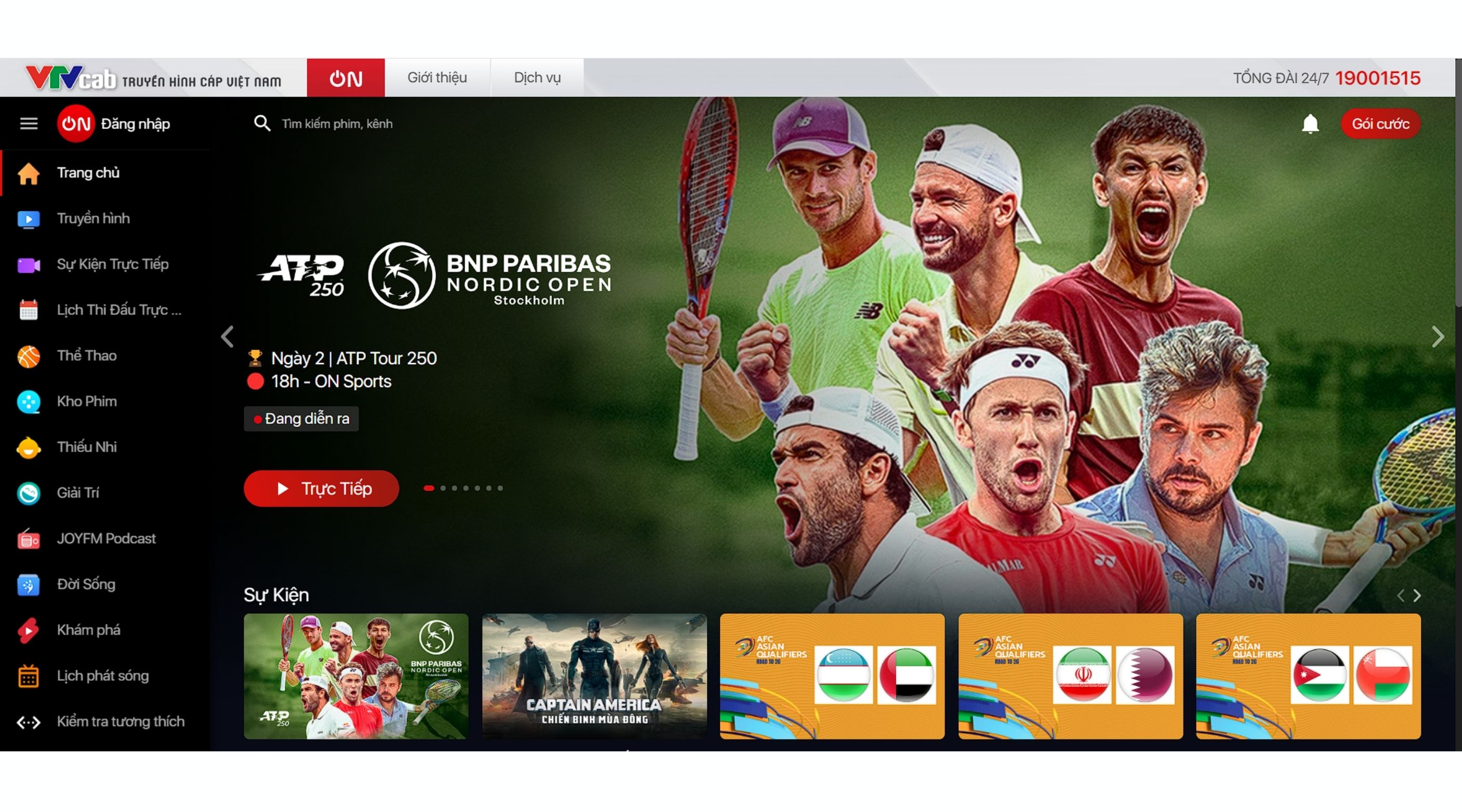
The Holy Power Of CDN In Sports Live Streaming In 2025
In the fiercely competitive world of sports streaming, we understand how crucial it is to connect with and keep your audience engaged. The heart of this connection lies in delivering a high-quality streaming experience. For content providers aiming to make a meaningful impact in the digital space, investing in advanced CDN solutions is not just a strategic decision—it’s an act of care towards providing viewers with exceptional streaming moments.
Introduction
The way sports streaming is transforming future CDN strategies is truly impressive. By driving the need for advancements in low latency, high scalability, and robust bandwidth management, these developments ensure seamless, real-time viewing experiences.
It’s inspiring to see how these emerging demands encourage CDN providers to innovate continually, guaranteeing that live sports broadcasts reach global audiences flawlessly.

Discover the Thrill of Sports Streaming
Live sports streaming set themselves apart in CDN requirements due to their unparalleled demand for real-time content delivery at scale.
To truly capture the excitement of a live sporting event or competitive gaming match, it’s crucial to transmit data with virtually no delay. Ultra-low latency isn’t just a nice-to-have; it’s an absolute necessity!
This capability guarantees that viewers can immerse themselves in the action as if they were right there in the moment, free from any disruptive lags or buffering. By ensuring seamless and instantaneous delivery, we preserve the thrill and intensity that make these experiences unforgettable, just like you are at the game!
The challenge intensifies when considering the global audience of such events, which can span millions of viewers across different continents, each expecting a seamless viewing experience. The scalability to accommodate these vast, geographically dispersed audiences without compromising on delivery speed underscores the specialized CDN strategies needed for sports content.
Furthermore, the interactive nature of modern e-sports events, including live chats, instant replays, and viewer polls, adds complexity to the CDN’s task. These interactive features demand the rapid delivery of video content and a two-way communication channel that can handle a massive volume of concurrent data exchanges.
This requirement for high bandwidth and ultra-responsive scalability places sports streaming in their own category, driving CDN providers to innovate beyond traditional content delivery methods.
Read more: Top 6 Best CDN Providers For Your Website
How are CDNs keeping up with the boom in sports streaming?
To keep pace with the booming popularity of sports streaming, CDNs are undergoing significant transformations. Recognizing the unique demands of live streaming, CDN architectures are being optimized for real-time data transmission, focusing on reducing the distance data travels by expanding the network of edge servers.
This geo-distribution strategy ensures that content is served to each viewer from the nearest possible location, drastically cutting down latency. In addition, adopting advanced caching mechanisms plays a pivotal role in managing the high traffic of live events.
By intelligently caching static segments of live streams and employing sophisticated algorithms to predict viewer demand, it can preload content closer to the viewer, further enhancing the speed of delivery.
On the technological front, integrating machine learning and artificial intelligence within CDN operations marks a leap forward in adaptive content delivery. These technologies allow it to analyze real-time network conditions, viewer behaviors, and content popularity, enabling automatic adjustments in content distribution to mitigate potential performance bottlenecks.
By proactively managing network resources and optimizing routing paths based on predictive analytics, CDNs are setting new standards in delivering the high-stakes, fast-paced content that sports streaming audiences demand.
Read more: CDN Review: Optimize Content Delivery For Your Business
What Role Does Latency Play in Live Sports Streaming?
Latency – the annoying mosquito!
The Premier League is gearing up, and it’s sizzling hotter than a summer barbecue! Naturally, everyone wants a front-row seat to the action. But just when you thought it was all fun and games, who crashes the party uninvited? LATENCY!
In live sports streaming, latency is the arch-nemesis of viewer satisfaction. The delay between the live event and its digital transmission can significantly diminish the excitement of watching a live game, creating a disconnect between the viewer and the real-time action.
For live sports, a delayed stream can spoil the communal experience of watching a game, as viewers might receive updates from faster sources, such as social media before they see the action unfold on their screens.
Just imagine when there’s a thrilling goal about to happen, and suddenly your TV freezes at that exact moment! How absurd would that be?

Combat against latency in live sports streaming
Content Delivery Networks (CDNs) are employing a range of strategies to address latency and improve the efficiency of content delivery from origin to end-users. These strategies include optimizing physical infrastructure to minimize the number of data hops, implementing TCP/IP optimizations, and using UDP-based protocols for quicker data transmission.
Moreover, the groundbreaking advancements in live streaming technology, like chunked transfer encoding, ignite a new era of immediacy by breaking down live content into smaller, more manageable pieces.
This thrilling innovation slashes the time needed to bring content to eager viewers. These incredible efforts highlight the indispensable role CDNs play in delivering electrifying content, ensuring that live sports and e-sports streaming captivate audiences with the unmatched thrill and excitement that only real-time action can deliver!
How might CDN strategies influence viewer engagement?

CDN strategies profoundly impact viewer engagement sports streaming. The quality of the streaming experience is paramount; viewers demand crystal-clear, high-definition visuals without interruption. A seamless stream directly translates to increased viewer satisfaction, which, in turn, fosters higher engagement rates.
Effective optimization techniques, such as edge computing, where content is processed closer to the end user, play a crucial role in minimizing delays and improving the quality of service. This reduction in latency ensures that viewers can enjoy live events as they unfold without the frustration of buffering or poor video quality, encouraging them to stay engaged for longer period of time.
Moreover, the adaptability of CDNs to handle peak traffic during high-profile sports finals is critical in maintaining uninterrupted service. The ability of a CDN to dynamically scale resources in response to viewer demand ensures that even the most watched events stream flawlessly to audiences worldwide.
This reliability is crucial in building a loyal viewer base and is instrumental in attracting a larger audience.
As CDNs continue to refine their strategies to meet these demands, the direct correlation between CDN performance and viewer engagement becomes increasingly evident, underscoring the importance of advanced CDN solutions in the success of sports streaming platforms.
The Future of Interactive Features in Sports Streaming
The Bright Sky!
As we look towards the future, it’s clear that CDN strategies will increasingly focus on supporting a more interactive and engaging viewer experience in sports streaming. Integrating interactive features such as user-controlled camera angles, holographic replays, and real-time voting or polling mechanisms will transform passive viewing into an active, engaging experience.
These features really pull viewers in and give fans more ways to get involved, making everyone feel like they’re a key part of the action!

CDNs must innovate beyond traditional content delivery methods to accommodate these advanced interactive elements. This includes the development of more agile and flexible content distribution networks capable of managing the increased data load and complexity that comes with interactive features.
Additionally, leveraging edge computing to process interactive elements closer to the viewer will minimize latency, ensuring the interactive features are as responsive as possible. As CDN providers navigate these challenges, the ultimate goal remains to create a rich, dynamic viewing experience that captivates audiences and sets a new standard for sports broadcasts.
Challenges and Solutions in Scaling CDNs for Global Sports Events
Scaling CDNs for global sports events is a formidable challenge, marked by the need to deliver consistent, high-quality streaming to millions of viewers simultaneously.
The key challenge lies in managing the massive spikes in traffic that accompany popular events, which can strain network resources and affect performance. To overcome this, CDN providers increasingly turn to advanced technologies such as AI and machine learning for more intelligent traffic management and predictive scaling.
These technologies enable CDNs to automatically adjust resources in anticipation of viewer demand, ensuring that capacity always matches needs.
Another critical aspect is enhancing data efficiency through better compression algorithms and more sophisticated content delivery protocols, which reduce the amount of data transmitted without compromising quality.
Additionally, forming strategic partnerships with ISPs and local content delivery networks can improve the reach and efficiency of content distribution, particularly in regions with less robust internet infrastructure.
By addressing these challenges with innovative solutions, CDN providers can ensure that global sports events are accessible worldwide, providing a seamless and enjoyable viewing experience that draws viewers closer to the action, no matter where they are.
How Will 5G Technology Influence Future CDN Strategies for Sports Streaming?
The advent of 5G technology is poised to reshape CDN strategies for sports streaming significantly. With 5G’s promise of exponentially higher speeds and drastically reduced latency, the potential for real-time, interactive streaming experiences becomes more achievable.
Higher Resolution – No More Delay!
This technological advancement will enable Content Delivery Networks (CDNs) to provide higher quality video content with minimal delay, closely resembling a live experience.
As 5G networks become more prevalent, CDN architectures are expected to evolve to take advantage of the increased bandwidth and reduced latency. This evolution will support the delivery of 4K, 8K, and even higher video resolutions to both mobile devices and home networks.

VR and AR Stream
Moreover, the advent of 5G technology is truly exciting as it paves the way for immersive viewing experiences like virtual reality (VR) and augmented reality (AR) streams. These innovations demand significant data throughput and ultra-low latency, and 5G rises to the occasion beautifully, offering us a glimpse into a future rich with possibilities.

CDN strategies will need to adapt to support these data-intensive formats, ensuring that content is not only delivered efficiently but also in a manner that maintains the immersive quality of the experience.
This shift towards embracing 5G capabilities will necessitate closer collaboration between CDN providers, content creators, and telecommunications companies, fostering a new ecosystem that enhances how we consume sports content.
Thu Do and our solution – Sigma Multi – CDN
About Sigma Multi – CDN
Have you ever felt like you were waiting forever for a movie website to load? It feels like standing in the middle of a busy road, wanting to move forward but being stuck.
That’s exactly how customers feel when they visit a slow-loading movie website. They will quickly go and look for another website that is faster and smoother.
If you are having the same issues, then don’t be worried. We got you covered!
Our solution, Sigma Multi CDN by Thu Do Multimedia will help your website “run” as fast as a leopard. Forget about being the “rabbit” in the turtle race, because our solution will give your business the best experiences:
- Increase Coverage by Area/Geography/ISP
- Improve overall service performance
- Risk prevention and automatic flow switching
- Reduce dependence on CDN providers
- Quality management/supplier commitment
- Optimize and balance CDN costs
With a globally distributed server network, your content will be distributed to the nearest user, significantly reducing page load time. Your content will be visible in front of the user in just a matter of seconds!
VTVcab ON Success with Sigma Multi CDN

VTV’s OTT platform transformation using Sigma Multi CDN is a testament to the power of effective content delivery. Here’s how they achieved remarkable results:
- 100% Global Coverage: Ensured their content reached audiences worldwide, even in remote regions.
- Expanded Reach: Broadcasted on 6 national, 5 regional, and hundreds of pay TV channels.
- Improved User Experience: Delivered faster load times and reduced bounce rates, leading to increased engagement and conversions.
Most of their live sport broadcasting are flawless and attract thousands of views from their audiences, thanks to Sigma Multi – CDN!
Conclusion
The future of CDN strategies is closely intertwined with the growth of sports streaming, driving the need for technological advancements to meet the high expectations of today’s viewers.
As CDNs evolve to address these unique demands, the result will be more engaging, immersive, and seamless streaming experiences for audiences worldwide, cementing the role of live sports and competitive gaming in shaping the digital entertainment landscape.
Unlock the Full Potential of Your Streaming Content with Thu Do Multimedia! Dive into the future of seamless sports streaming experiences with our advanced CDN technology. Sigma Multi CDN delivers your content with lightning-fast speed and impeccable reliability, keeping your audience engaged and connected.
Say goodbye to buffering and hello to high-definition streaming that meets the demands of today’s viewers!



Recent Comments